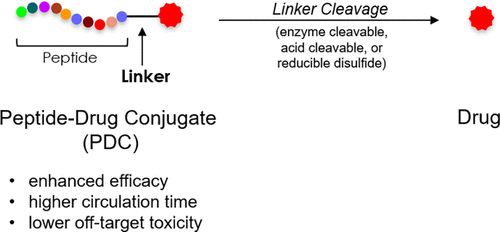当前位置:
X-MOL 学术
›
J. Med. Chem.
›
论文详情
Our official English website, www.x-mol.net, welcomes your
feedback! (Note: you will need to create a separate account there.)
Peptide–Drug Conjugates with Different Linkers for Cancer Therapy
Journal of Medicinal Chemistry ( IF 6.8 ) Pub Date : 2020-12-31 , DOI: 10.1021/acs.jmedchem.0c01530 Mona Alas 1 , Azam Saghaeidehkordi 1 , Kamaljit Kaur 1
Journal of Medicinal Chemistry ( IF 6.8 ) Pub Date : 2020-12-31 , DOI: 10.1021/acs.jmedchem.0c01530 Mona Alas 1 , Azam Saghaeidehkordi 1 , Kamaljit Kaur 1
Affiliation

|
Drug conjugates are chemotherapeutic or cytotoxic agents covalently linked to targeting ligands such as an antibody or a peptide via a linker. While antibody–drug conjugates (ADCs) are now clinically established for cancer therapy, peptide–drug conjugates (PDCs) are gaining recognition as a new modality for targeted drug delivery with improved efficacy and reduced side effects for cancer treatment. The linker in a drug conjugate plays a key role in the circulation time of the conjugate and release of the drug for full activity at the target site. Herein, we highlight the main linker chemistries utilized in the design of PDCs and discuss representative examples of PDCs with different linker chemistries with the related outcome in cell and animal studies.
中文翻译:

用于癌症治疗的具有不同接头的肽-药物偶联物
药物偶联物是化学治疗剂或细胞毒剂,通过接头与靶向配体(例如抗体或肽)共价连接。虽然抗体-药物偶联物 (ADC) 现在已在临床上用于癌症治疗,但肽-药物偶联物 (PDC) 正作为一种新的靶向药物递送方式获得认可,可提高疗效并减少癌症治疗的副作用。药物偶联物中的接头在偶联物的循环时间和药物释放以在靶位点充分发挥活性方面起关键作用。在此,我们重点介绍了 PDC 设计中使用的主要接头化学成分,并讨论了具有不同接头化学成分的 PDC 的代表性示例以及细胞和动物研究中的相关结果。
更新日期:2021-01-14
中文翻译:

用于癌症治疗的具有不同接头的肽-药物偶联物
药物偶联物是化学治疗剂或细胞毒剂,通过接头与靶向配体(例如抗体或肽)共价连接。虽然抗体-药物偶联物 (ADC) 现在已在临床上用于癌症治疗,但肽-药物偶联物 (PDC) 正作为一种新的靶向药物递送方式获得认可,可提高疗效并减少癌症治疗的副作用。药物偶联物中的接头在偶联物的循环时间和药物释放以在靶位点充分发挥活性方面起关键作用。在此,我们重点介绍了 PDC 设计中使用的主要接头化学成分,并讨论了具有不同接头化学成分的 PDC 的代表性示例以及细胞和动物研究中的相关结果。











































 京公网安备 11010802027423号
京公网安备 11010802027423号